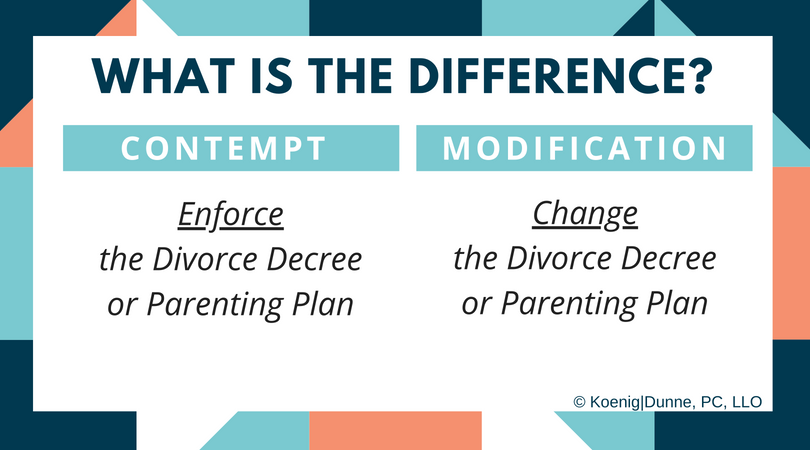After a divorce has become final, problems can arise between former spouses in complying with the terms of their divorce. For example:
- My former spouse is not following our parenting plan.
- My former spouse has not transferred property as ordered in our divorce decree.
- My former spouse refuses to pay child support or alimony.
To address these types of post-divorce issues, your attorney may recommend initiating a “contempt” action or a “modification” action, or both. The following explains the purposes and differences between these two possible actions.
Contempt Actions
The purpose of a contempt action is to ask a court for help in enforcing your divorce decree or parenting plan. For example, if your former spouse is not paying child support, a contempt action would ask the court to hold your former spouse accountable for not doing so. Typical enforcement measures taken by Nebraska courts to ensure compliance with your divorce decree or parenting plan include: monetary fines, additional temporary parenting time, and even jail in the most extreme circumstances.
Modification Actions
As the name implies, the purpose of a modification action is to ask a court to change something in your divorce decree or parenting plan. For example, if your parenting plan was originally drafted in contemplation of you and your former spouse both residing in the same city, a modification action may be necessary to address either person’s desire to relocate to a different city or state.
Which Action is the Appropriate Action?
Generally speaking, if the post-divorce issue you are experiencing can be summarized as your former spouse’s unwillingness to comply with your divorce decree or parenting plan, then a contempt action is probably the appropriate action. Alternatively, if circumstances have changed between you and your former spouse, rendering your divorce decree or parenting plan dated or inappropriate, then a modification action may be the appropriate action. It is important to consult with your attorney to determine whether either—or both—is the appropriate action to address the post-divorce issues.
Your legal team at Koenig|Dunne is here to provide guidance on the differences between contempt actions and modification actions to ultimately ensure that the post-divorce issues you are experiencing with your former spouse are properly addressed.

